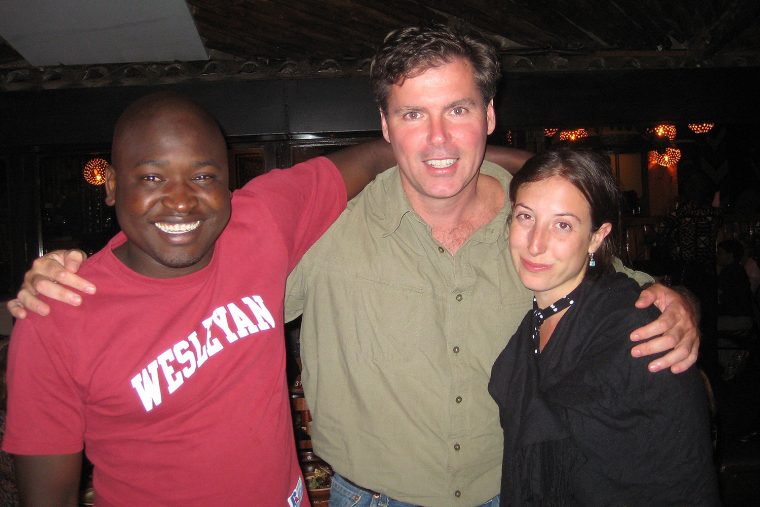In March, during Wesleyan's spring break, Associate Professor of Molecular Biology and Biochemistry Michael McAlear took a trip to visit and catch up with three alumni whom he’d known when they were undergraduates, just beginning the nonprofits for which they are now known. McAlear doesn’t see them often: they live and work in Africa. All three had received Wesleyan's Christopher Brodigan Award in their senior year, for research or work in Africa. McAlear’s first stop was in Kibera, the largest slum in Kenya, and home of SHOFCO, Shining Hope for Community, the nonprofit begun by Jessica ’09 and Kennedy ’12 Odede. Linking…
Michael McAlear, associate professor of molecular biology and biochemistry, is co-author of “A New System for Naming Ribosomal Proteins” published in Current Opinion in Structural Biology 24:1–5 in 2014.
(Story contributed by Jim H. Smith) A recent discovery made by Michael McAlear, chair and associate professor of molecular biology and biochemistry, and four of his students helps explain the function of ribosomes and sheds light on genetic processes scientists have been trying to decode for more than half a century. A paper authored by McAlear and his laboratory team, describing the discovery, was published last month in the distinguished journal BMC Genomics. The discovery resulted from long-term research into the regulation of ribosomes, often described as molecular “machines,” the organelles of all living cells in which protein synthesis occurs. Guided…
Michael McAlear, chair and associate professor of molecular biology and biochemistry, is the co-author of "The adjacent positioning of co-regulated gene pairs is widely conserved across eukaryotes," published in BMC Genomics, October 2012. The article is online here. The co-authors are Ph.D candidate James Arnone and Jeffrey Arace '12; Adam Robbins-Pianka BA '08, MA '10; and Sara Kass-Gergi '12. The team investigated co-regulated gene sets in S. cerevisiae beyond those related to ribosome biogenesis, and found that a number of these regulons, including those involved in DNA metabolism, heat shock, and the response to cellular stressors were also significantly enriched for adjacent gene…
The Molecular Biology and Biochemistry Department sent three professors and six students to the international 2012 Yeast Genetics & Molecular Biology Meeting held at Princeton University recently, giving Wesleyan the largest per capita representation in the world. Attending from the department were Associate Professor and Chair Michael McAlear and his graduate student, James Arnone; Assistant Professor Amy MacQueen and her graduate students Pritam Mukherjee and Lina Yisehak, and recent alumni Sarah Beatie '12 and Louis Taylor '12; and Associate Professor Scott Holmes and his graduate student, Rebecca Ryznar. All spoke or presented on various aspects of yeast genetics, molecular biology,…
Michael McAlear, chair and associate professor of molecular biology and biochemistry, and James Arnone, a Ph.D candidate in his lab, have published “Adjacent Gene Pairing Plays a Role in the Coordinated Expression of Ribosome Biogenesis Genes MPP10 and YJR003C in Saccharomyces Cerevisiae” a paper that shows that the physical position of genes on chromosomes -- immediately adjacent gene pairs in particular -- plays an important role in how they are turned on and off. These findings were first discovered in yeast cells, but also hold true over a wide range of life forms, from worms to fruit flies to humans.…
In August, Michael McAlear, chair and associate professor of molecular biology and biochemistry, presented an interactive lecture about Africa’s water cycle to the Kibera School for Girls. Kennedy Odede '12 and Jessica Posner '09 operate the school and the non-profit organization Shining Hope for Communities in Kibera, Kenya. McAlear’s lecture included an experiment with test tubes he brought for the school. His sons, Matthew and Thomas, donated time in the school’s library. “We cannot thank Professor McAlear and his sons enough for their generous donation of supplies, time, and energy,” Posner says in her blog.


